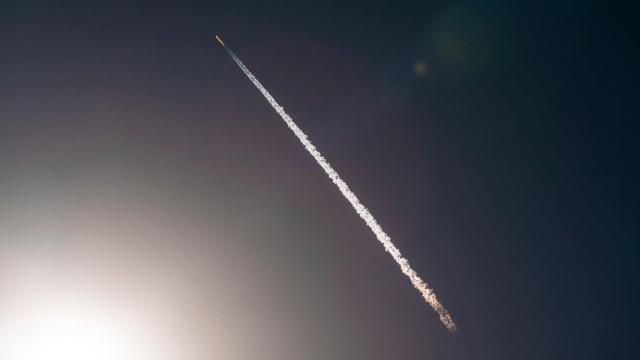A SpaceX Falcon 9 rocket carried an additional 52 Starlink satellites to low Earth orbit on Tuesday night, raising the total number of Starlinks launched by the company to a whopping 3,009.
The rocket lifted off from pad 39A at the Kennedy Space Centre in Florida at 10:14 p.m. ET. Following separation, the Falcon 9’s first stage performed a successfully vertical landing on the A Shortfall of Gravitas droneship based in the Atlantic Ocean, while the second stage deployed the satellites into orbit.
Liftoff! pic.twitter.com/j5xpFbHplK
— SpaceX (@SpaceX) August 10, 2022
Falcon 9 is the hardest working rocket in the game, with the latest launch marking the 35th Falcon 9 mission in the current year alone. The majority of these missions have been to deploy more Starlink satellites to orbit, as SpaceX continues to build out its satellite megaconstellation. Together, the impressively large fleet of interconnected satellites provide internet connectivity across the world. SpaceX’s Elon Musk is hoping to launch a whopping total of 42,000 satellites to Earth orbit, providing connectivity to users across land, air, and sea. So far, the Federal Communications Commission has approved 12,000 Starlinks for launch, with the remaining 30,000 pending approval.
A total of 2,957 Starlink satellites had entered space prior to yesterday’s launch, of which 2,698 satellites are currently in orbit and 2,662 are currently operational, according to stats collected by astrophysicist Jonathan McDowell.
SpaceX is miles ahead of the competition when it comes to flying its internet satellites to space, an accomplishment largely do to the fact that SpaceX is both a rocket company and a satellite company. OneWeb, a SpaceX competitor in this realm, has even turned to SpaceX to help it launch its satellites to orbit to form a much smaller internet constellation consisting of 648 satellites. Amazon is also planning to launch a fleet of 3,236 satellites for Project Kuiper. The company recently booked 83 trips to launch its satellites on board rockets from Arianespace, Blue Origin, and United Launch Alliance, while omitting SpaceX from the mix.
As these companies rush to build out their artificial constellations across the skies, astronomers are getting increasingly worried that the new internet satellites will continue to pose a threat to observations of the cosmos. SpaceX has made efforts in the past to dim the brightness of its satellites, but with bigger and brighter satellites planned ahead, it’s not looking good for future views of the night sky.
More: Chinese Researchers Publish Strategy to Destroy Elon Musk’s Starlink
